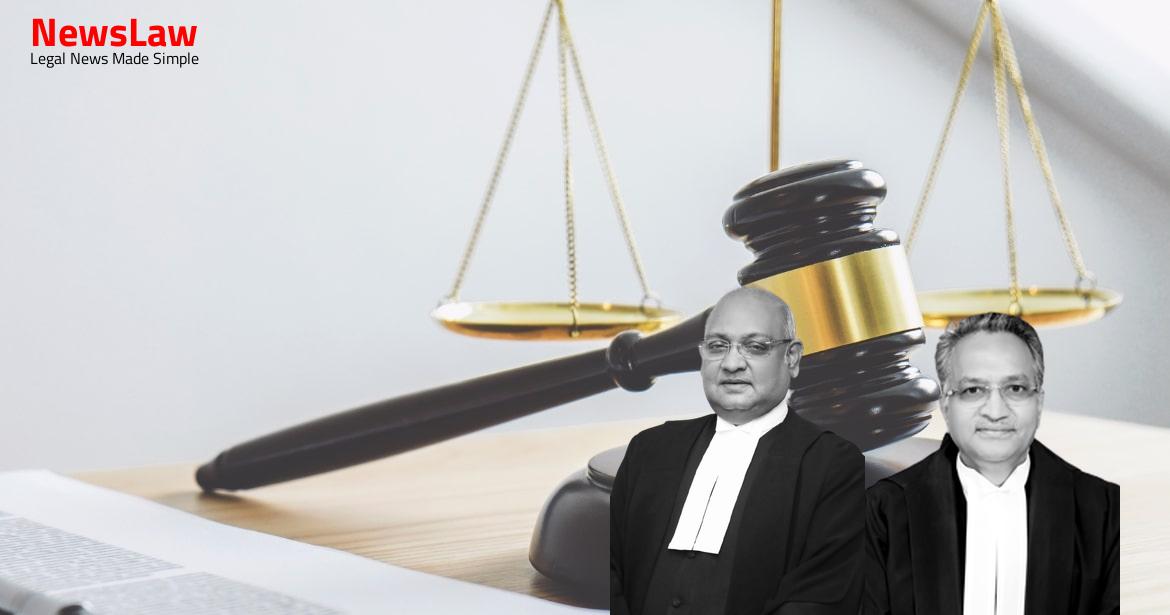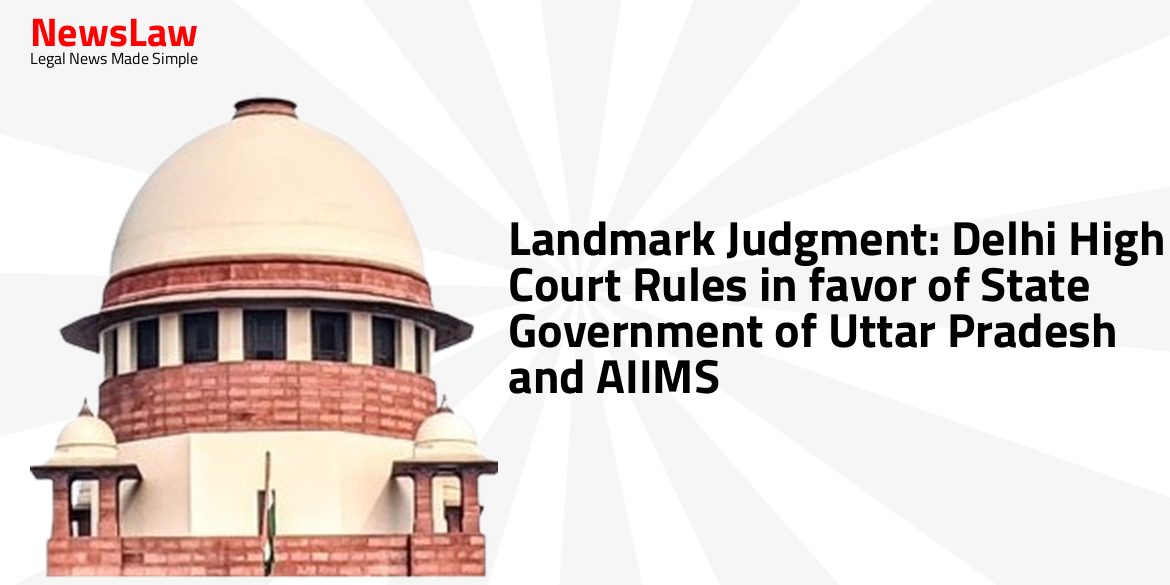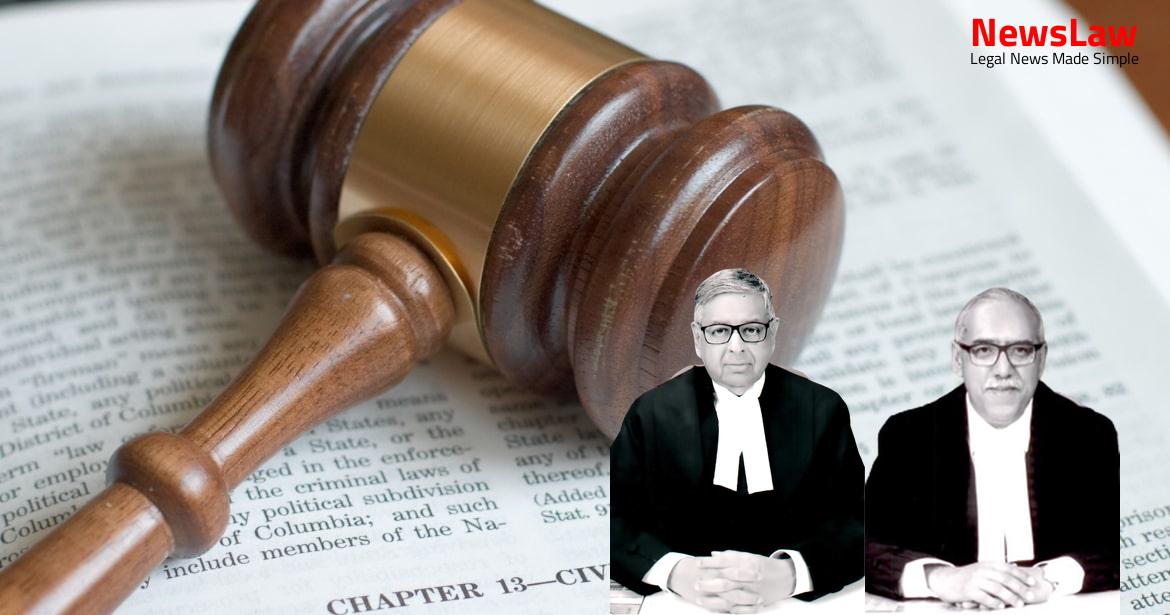Explore the detailed legal analysis conducted by the Supreme Court regarding the provisions of the Foreign Exchange Regulation Act. The court’s emphasis on the mandatory requirement of RBI permission for property transactions by non-citizens sheds light on the importance of compliance with statutory provisions. Discover how the court’s interpretation aligns with the general policy of restricting foreigners from dealing with Indian real estate without proper authorization.
Facts
- Mrs. F.L. Raitt, without obtaining permission from RBI, gifted the property to respondent No.1 and later executed a supplementary gift deed.
- RBI granted permission for transfer to Mr. R.P. David after the death of Mrs. F.L. Raitt.
- Mrs. F.L. Raitt filed a suit to declare the power of attorney and sale deed in favor of Mr. R.P. David as null and void.
- Central issue was the transaction under Section 31 of the Foreign Exchange Regulation Act.
- Trial Court dismissed the suit, but a ratificatory agreement to sell the property to Mr. R.P. David was mentioned.
- Gift deed of a portion of the property was also made without RBI permission.
- Appeal was filed against the Trial Court’s decision.
- Multiple suits were filed involving different parties and properties.
- Issues related to power of attorney and permanent injunction were framed in the suits.
- The suit of the plaintiff is decreed.
- The Trial Court issued separate judgment and decree on 31.08.2001.
- After analysing the pleadings and evidence on record, the Court allowed the suit.
Also Read: Legal Analysis on Diplomatic Immunity Exception Case
Issue
- Plaintiffs need to prove if Mrs. Florence L. Raitt executed the General Power of Attorney dated 26.1.83 willingly.
- Plaintiffs must prove if deceased David purchased the entire suit property and if it is binding on the defendant.
- Defendant needs to prove if the General Power of Attorney executed by Florence L. Raitt in favor of Mr. Peter Philip is not genuine.
- Plaintiffs should prove their entitlement to recover past mesne profits at the rate of Rs.200/- per month.
- Defendant has to prove if the General Power of Attorney dated 1.1983 was procured through fraud, misrepresentation, coercion, undue influence, or breach of trust.
- Defendants must prove if the suit schedule property was bequeathed to defendant – 1 under the will executed by Mrs. Florence Raitt without any conditions.
- The plaintiff’s entitlement for mesne profits and at what rate needs to be determined.
- The plaintiff’s entitlement to the possession of the suit schedule property is to be established.
- Analysis required to determine if the plaintiff is the owner of the suit schedule property as per the terms of the sale deed dated 9.4.83.
- Investigation needed to determine if the gift deed dated 11.03.1977 and the supplementary deed dated 19.04.1980 in favor of the defendant are void under the Foreign Exchange Regulation Act, 1973.
Also Read: Autonomy of Private Unaided Schools in Fee Determination
Arguments
- The petitioner argued that the action of the respondents in issuing a tender for the same work during the pendency of the suit was an abuse of process and sought a stay against such action.
- The contention was that the respondents were bound by the decision of the Single Judge and should not have initiated parallel proceedings.
- The petitioner further contended that the stay of the suit was wrongly vacated by the Division Bench without considering the facts and circumstances of the case.
Also Read: Land Ownership Dispute Legal Analysis
Analysis
- The requirement of seeking previous permission of the RBI under Section 31 of the 1973 Act is mandatory.
- The transfer of immovable property situated in India by a person who is not a citizen of India without RBI permission is unenforceable in law.
- The purport of Section 31 must be understood in the context of its enactment, general policy, and other provisions like Sections 47, 50, and 63 of the 1973 Act.
- The stringent dispensation under Section 31 prohibits foreigners from dealing with real estate in India without prior RBI permission.
- The consequences for contravention include penalty under Section 50 and possible confiscation of property as per Section 63 of the Act.
- The expression ‘void’ and ‘voidable’ have been considered in numerous court cases, and in this context, the transaction in contravention of Section 31 is deemed unenforceable.
- The judgment emphasizes that the transaction remains forbidden until RBI permission is granted.
- The onus is on non-citizens holding property in India to make required disclosures and seek RBI permission for any property transactions.
- Contrary views by High Courts have been critiqued for not aligning with the intent and spirit of Section 31 of the 1973 Act.
- The Court reinforces that without previous RBI permission, any property transfer by a foreign national in India is deemed voidable at best and unenforceable until such permission is obtained.
- The Single Judge of the High Court relied on the decision of Punjab & Haryana High Court in the case of Piara Singh v. Jagtar Singh and Anr.
- The lack of permission under Section 31 of the 1973 Act does not make the gift deeds void, illegal, or unenforceable according to the High Court’s decision.
- The challenge related to the lack of permission was dismissed by the High Court.
- Lord Denning, M.R. distinguished between two kinds of invalidity – one a grave nullity, and the other a penalty imposed by statute.
- A contract is void if it involves an act prohibited by a statute.
- Enforcement of a contract against any provision of law renders the contract illegal.
- Contracts involving the intent to commit illegal acts or those prohibited by statute are unenforceable.
- If a penalty is imposed by statute for public policy reasons, the prohibited act will be treated as void.
- The Court emphasized the need to interpret Section 31 of the 1973 Act considering the general policy restricting foreigners from transacting in Indian real estate.
- Private agreements cannot override the general law.
- Legislation aimed at protecting the economy can be recognized by foreign courts but must be complied with to be enforceable.
- Contravention of Section 31 of the 1973 Act renders a transfer void, as noted in various judgments.
- Prohibition and negative words in statutes are rarely seen as directory.
- A statute imposing a penalty for an act not necessarily prohibited makes the act unlawful due to public policy reasons.
- Section 47 of the Foreign Exchange Regulation Act (FERA) prohibits individuals from entering into any contract that would evade the provisions of the Act.
- Non-residents are not allowed to dispose of immovable property in India without prior permission from the Reserve Bank of India (RBI), except in the case of leasing for a period not exceeding five years.
- The penalty for contravening the Act can be up to five times the amount involved or Rs. 5,000, whichever is more, as adjudged by the Director of Enforcement.
- Any currency or property involved in a contravention under FERA may be confiscated by the Central Government.
- The general policy of investment by foreigners in India has changed, leading to the repeal of the 1973 Act.
- The decisions of High Courts holding contrary views are being overruled prospectively.
- The Supreme Court is issuing a declaration/direction using its powers under Article 142 of the Constitution of India.
- The Trial Court and High Court made a mistake in dismissing the plaintiff’s suit for a declaration regarding a property and consequential reliefs.
- The view that Section 31 of the 1973 Act is not mandatory is deemed incorrect by the Supreme Court.
- Existing transactions that have been legally finalized need not be affected by this judgment.
Decision
- The impugned judgment and decree of the Trial Court, as confirmed by the High Court, is set aside.
- The appellant, as the legal representative of the plaintiff, is entitled to possession of the suit property and mesne profits.
- A separate inquiry will be conducted for determining mesne profits under Order 20 Rule 12 of the Code of Civil Procedure, 1908.
- No costs are awarded.
- All pending applications are disposed of.
- O.S. No.10079 of 1984 filed by Mr. R.P. David (predecessor of the appellant and respondent no.4) is decreed in favor of the plaintiff.
- The appeal is allowed.
Case Title: ASHA JOHN DIVIANATHAN Vs. VIKRAM MALHOTRA . (2021 INSC 121)
Case Number: C.A. No.-009546-009546 / 2010



